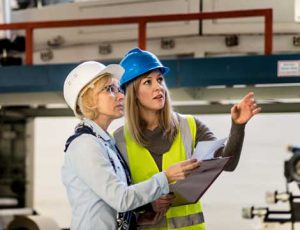Women seek employment opportunities in every industry, including construction. It’s a viable career path with room for advancement, but the construction trades sector is 96% male, so it may be challenging for women to find a way in. The recently passed infrastructure bill could change that.
Here’s everything you need to know about the infrastructure bill and how it could help more women find construction jobs. Diversity could benefit the industry if workers and leaders have the tools to make it happen.
The Infrastructure Investment and Jobs Act became law on November 15, 2021, to further fund the nation’s infrastructure and the people supporting it.
Specifically, the $1.2 trillion used by the bill over the next 10 years will focus the national economy in the areas of:
The additional employment opportunities specifically help women in construction who have difficulty finding industry jobs for various reasons. Funding assistance from the infrastructure bill will remove these obstacles.
Women may not feel welcomed by the construction industry for various reasons. First, they see that it’s a male-dominated industry, making it challenging to picture themselves in similar shoes.
Additionally, statistics show that 88% of female construction workers have experienced sexual harassment on the job. Feeling unsafe, underpaid and underrepresented contribute to the lack of women in construction.
Research shows that across all industries, women only receive 82% of a male worker’s wages, according to data from the U.S. Bureau of Labor Statistics (BLS). Anyone with dreams of living comfortably, going to college or providing for a family needs fair wages. What people may not know is that women in construction careers actually earn 95.5% of men’s wages, which is significantly better than other industries.

Diversity would make the construction industry more appealing to job seekers and solve any lack of workers. These are a few ways the infrastructure bill could make that possible.
A portion of the infrastructure bill outlines a six-year plan to provide no-cost preschool for families with 3- and 4-year-olds. With $400 billion funding each child’s enrollment and each school’s curriculum, parents would have more money left over each month for their financial goals.
The cost of child care averages around $10,000 annually for one child. Removing those expenses would boost anyone’s monthly budget. Experts estimate that women could earn $97,000 more in their lifetimes if affordable child care was provided. Universal preschool could make that a reality, allowing more women to enroll their children and work full-time again.
Technological advancements made possible by infrastructure bill funding could lead to more safety in the workplace for women in construction.
The future of technological advances also includes tech like virtual reality (VR). VR simulators would train new workers in safer environments, which might otherwise make people hesitate to apply. They’ll learn how to become experts at their jobs without the potential dangers of real-world training.
Infrastructure is a term that covers a vast amount of opportunities for women in construction. The recent bill divides its funding into sections to make more construction jobs possible for women with various skill sets.
The most notable expansion within the bill is road and bridge funding. Women will have more employment opportunities as companies seek new hires for repair and construction jobs. Bridges alone need specific attention. Infrastructure experts estimate that 45,000 bridges are in poor condition and require immediate repairs.
Over 45,000 bridges would require additional construction workers. Women could choose to help repair them or work in other roles. Additional benefits of the infrastructure bill’s funding — such as increased broadband access and green energy — also require the construction of utility poles, green energy grids and building improvements.
Notably, women could also get jobs producing the equipment necessary to provide these things as well. The industry’s spending will likely grow by 5.5% this year alone as companies need equipment and materials to complete projects.
No one can start a construction job without training, so many people begin their infrastructure careers in an apprenticeship program. Given how many jobs the bill will likely create, the White House also launched an Infrastructure Talent Pipeline Challenge.
The challenge requires commitments from participating businesses in construction, electrification and broadband. They need to guarantee high-quality training for interested workers. They also must focus on educating traditionally underrepresented groups, such as women.
These commitments will make it easier for women to get accepted into training programs that are historically much less expensive than enrolling in a university. They’ll get the training they need to jumpstart their construction careers because businesses are opening their doors to receive ongoing funding.
When the infrastructure bill passed, some people worried that the new jobs would either remain empty or get filled with workers in existing demographics. The U.S. Department of Labor (DOL) and the U.S. Department of Transportation (DOT) responded by releasing a memorandum of understanding (MOU) to pledge their help in diversifying benefiting industries.
The MOU explains how both departments will modernize the created jobs with more diverse hires with efforts such as:
Women will have the federal government’s backing when they begin applying for construction jobs created by the infrastructure bill. Instead of hoping to get hired, they can trust in obtaining a fairer chance of landing a position equal in pay and standing to those of their male counterparts.
The infrastructure bill could create new opportunities for women seeking jobs in the construction industry. Supporting them economically and professionally will open doors so women have more professional options within the sector.